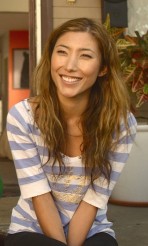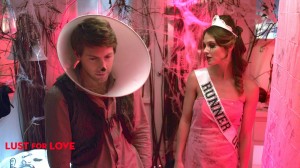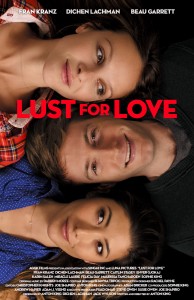LUST FOR LOVE, which premieres on Video on Demand and iTunes on February 7, is an independently-made, low-budget L.A. romantic comedy, written and directed by Anton King. Fran Kranz (DOLLHOUSE, CABIN IN THE WOODS, MUCH ADO ABOUT NOTHING) plays Astor, who has spent his whole life in love with Mila, played by Beau Garrett (TRON: LEGACY, CRIMINAL MINDS: SUSPECT BEHAVIOR). When Mila breaks up with him, Astor enlists the help of female best friend Callie, played by Dichen Lachman (DOLLHOUSE, BEING HUMAN, LAST RESORT) in winning back his girlfriend. The movie also features other DOLLHOUSE alumni including Enver Gjokaj, Miracle Laurie, Felicia Day and Maurissa Tancharoen (who is now one of the creators/executive producers of AGENTS OF SHIELD).
Lachman, born in Katmandu, Nepaland raised in Australia, produced LUST FOR LOVE with writer/director King. In a phone interview, Lachman talks the hows and whys of ultra-low-budget filmmaking.
AX: Anton King is also Australian. Did you know each other when you were in Australia?
DICHEN LACHMAN: Yeah, we moved to Los Angeles together. Anton and I actually used to be a couple. We separated about four years ago, but we’ve been working together since.
AX: How and when did LUST FOR LOVE come into being as a project?
LACHMAN: Anton had been working on the LUST FOR LOVE idea for many years, but just as a short. When we separated, he went back to Australia and was traveling a little and he was actually in Viet Nam and ended up just writing the script within about two or three months. He sent it to me and said, “Would you like to work on this together?” and I read it and I really liked it and I immediately started casting it in my head with all our friends and it just kind of went from there. Initially, when he said, “Do you want to do it?”, I didn’t even know how. I’d never made a film before – a short film, but not a feature – but he mentioned Kickstarter and we racked our brains in terms of who we knew in terms of line producers and people that could help us make it happen and we just took it from there.
AX: Did you raise most of the money for the film’s budget on Kickstarter?
LACHMAN: We raised a portion of the money on Kickstarter. Our goal was to try and keep it as low-budget as possible, because we couldn’t afford to really go too big at the time, but one of the things with films is you’re always needing more money [laughs], and so we’ve just been fueling the film ever since we finished shooting. We ran out of money a few days before we wrapped principal photography and so it’s been a very expensive and challenging venture, but I hope it’s been worthwhile and people do seem to enjoy the movie, so that’s a great relief to me and Anton, because we’ve been working so hard on it and funding it [laughs].
AX: When you started, did you know how much money you needed for the budget?
LACHMAN: No, we didn’t. As I said, we’d never done this before and Anton initially thought, “We’ll do it really cheap. Our goal is seventy thousand dollars.” And the fans really came out and really supported us, and we really went over what we initially estimated we needed. Little did we know that wasn’t nearly enough. For any aspiring filmmakers out there, one of the things that I learned from this process is that post is just as expensive as the actual shooting of the thing, and all the things that you can’t see are the most expensive [laughs]. We were just guessing. I guess we could have been a little bit more diligent about doing a more organized budget beforehand in terms of post, but at the end of the day, I think it’s there. The fans showed up and then we showed up as well, so it gave the film a little more meaning in that way, if that makes sense, because it was like a fifty-fifty kind of thing. We have a stake in it, absolutely.
AX: Were the fans primarily or entirely DOLLHOUSE fans?
LACHMAN: Some of them were fans from a show I did in Australia called NEIGHBOURS, but I would say that they were primarily DOLLHOUSE fans, yes.
AX: When Anton King said, “Do you want to do this together,” did you come to him and say, “How do you feel about using most of the DOLLHOUSE cast?”
LACHMAN: [laughs] Well, that was just sort of a byproduct of our circumstances, because when I moved to L.A., we didn’t really know many people, and DOLLHOUSE was my first experience working in this country in a meaningful way, and where I established most of my meaningful friendships. Enver Gjokaj is like my brother. He’s basically in my house every day, and Maurissa [Tancharoen] is my family here as well, and Fran [Kranz] – these people, after having worked with them for two years, they were my community here. And it’s natural to want to work with your friends, especially when you’re doing something as extraordinarily challenging as making a low-budget film.
AX: When the script was being developed, did you have much input?
LACHMAN: Yes. I gave Anton my notes. He didn’t always take them [laughs], but I had a lot of thoughts and he would go away and decide whether or not he would incorporate them, and so did Fran and Beau, and even other friends of ours who read the script were invaluable in terms of giving notes.
AX: Was the character of Callie written specifically for you to play?
LACHMAN: Well, Anton intended for me to play one of the roles, and we did oscillate between, “Well, I could be this or I could be that, or while I’m producing, maybe I should take a smaller role,” so there was a lot of moving around. And also getting the other cast involved. I wanted everyone else to feel like they had a good part. But Anton and I had such a long relationship together, he wanted me to be a pivotal part in this and he thought it could be interesting to have me in one of the bigger roles. Because of how I look, I don’t always get the opportunity to do things like this; it’s not very often you see an Asian person in a romantic comedy film. And so for him, it was important to put me in a pivotal part, because he wanted me to have that opportunity, and I’ll always be grateful for that, and I do think it’s important for me to have that opportunity and I’ll always be grateful for that, and I do think it’s important that we sort of diversify that core cast in that genre of films.
Asian people usually are in the background of films, in the corners, and I’ve experienced that, too. Often, I’m very lucky to work, but not always. In BEING HUMAN, I had a very pivotal role and the same in DOLLHOUSE, but sometimes you’re on the side and people are nervous to give you the opportunity to be a lead or really drive something.
AX: In BEING HUMAN, you were a total femme fatale vampire, especially in the flashbacks in the Thirties, when you were dressed up in very glamorous period garb.
LACHMAN: Oh, what an amazing opportunity. I’ve always wanted to do that and I thought, “Who in the world is going to put me in 1930sAmerica?” But they did and it was such an honor and a privilege to be able to do a period piece, with the way I look [laughs], it was a real treat.
AX: You also had guys played by Sam Witwer and Kyle Scmid fighting over you.
LACHMAN: They’re lovely guys, great actors.
AX: How was it playing a vampire?
LACHMAN: Very sticky. That fake blood – it’s like cement. Or like toffee. It’s runny when it starts off and then it just gets stickier and stickier until it just goes hard. But in terms of playing living in the shadows, it was an absolutely joy as an actor. I always wanted to play a vampire and when I got that role, I was over the moon. I think that it’s such an interesting world to explore – Jung calls it “the shadow self” and I think that vampires kind of encapsulate that part of being a person, and they live in that space. Obviously, people who are functioning in society, we can’t live like that. Having permission to inhabit that base sensuality, that hunger and that violence, you can do it in a safe place and be creative and have fun with it, so I was very lucky. The creators of the show are just the loveliest people and they had a great writing team and people really loved the show, so I think they did something special, and people are going to love that show for years to come.
AX: You were also on THE LAST RESORT …
LACHMAN: Yes. Great show, which didn’t get its opportunity to really fly, I think. But I was very fortunate to have been a part of that. [Series creators] Karl [Gajdusek] and Shawn [Ryan] are wonderful people and very good at what they do and it was just a privilege to be able to work with them. I think LAST RESORT could have really gone on to have been a great show, but you know, as it goes, sometimes things just don’t take off.
AX: When you were working on DOLLHOUSE and BEING HUMAN and LAST RESORT, did you learn anything that came in handy with making LUST FOR LOVE?
LACHMAN: I think one of the wonderful things that has come out of me being able to have the opportunity to be on set for so many hours is just the sheer kind of knowledge of just how things work and how things are set up, just the structure of it. And I always make friends with the crew and learn about all these different departments and how it works – that’s just one functional thing that comes from being on set for so many hours. But a lot of the rules that apply in the world that I’ve been working in don’t really apply in independent filmmaking. On a big set like LAST RESORT, no one would even let me pick up a single thing, because maybe it’s a union issue or an insurance issue, but on [LUST FOR LOVE], I was carrying equipment, C-stands, cleaning toilets, moving chairs, doing set decoration, wardrobe, makeup [laughs] – I was doing everything along with the crew, because so many of our crew on LUST FOR LOVE were volunteers and I felt I couldn’t in good conscience stand around learning my lines when they were working so hard. So it was very much helping everyone set up, making sure everyone was fed and happy and everything was working smoothly, then running in front of the camera and then helping them turn around. It was very hands-on and bless the people that came and helped us, because we couldn’t have done it otherwise. I think some days we had fifteen or twenty volunteers that just came to help us make this little movie, and some of them had never been on sets before. So coordinating – “You take care of this and I’ll take care of that” – that would never happen on a big-budget thing. The actors would be very separate and padded. And there’s a reason for that, because it’s very difficult to perform and really think about anything else. And that might be one of my regrets for LUST FOR LOVE, is that I’m worried that I wasn’t prepared enough or in the right moment all the time, because I was thinking about a million other things. At the same time, sometimes I think it could have been a good thing, because I wasn’t thinking about it too much and I only had time to be honest and authentic, because I really did have so much to do, so it was very, very different.
AX: So you weren’t over-thinking it.
LACHMAN: Yeah. Because I knew that we had to get a specific shot and I knew that lunch was coming up and we had to feed everybody and had to organize the tables, little things that were always on my mind that when I’m working in other scenarios, it’s just not part of my thinking.
AX: When did you actually shoot LUST FOR LOVE?
LACHMAN: We shot the film end of 2011 in December. We ran out of money, so Anton was working on the film by himself with another guy, Joe Shapiro. It was just the three of us giving notes and trying to find the right edit. And then we had to pay for sound and color grading and the [sound] mix and music and the list just goes on and on and on. So it’s been a long process of finessing the film and finding the right way to cut it, because it’s actually different to the script now. There are a few things that we moved around to make it better and we really wanted to make a quality film and didn’t want to rush it out of the gate unfinished. So we really took our time to finesse the visual effects, which are all invisible, of course, but that was a time-consuming and lengthy process. And then of course finding the right people to get it out there is also another part of the process and not an easy task, but we found some people who believed in us, and believed in the movie, and wanted to get it out there for people to see.
AX: Do you feel that it helped you as a producer to be on set as an actress, or were you thinking, “Oh, my God, I need to get to a telephone” all the time?
LACHMAN: Some days, it was like that. But it’s a huge challenge. I have a huge respect for people who make independent films. Everyone has to wear many hats. There were times when I was like, “Anton, please let’s move on, because I know that we have a bunch of other stuff to get.” He’d be like, “Oh, let’s do it again.” I’m like, “Anton, we don’t have time!” [laughs] We were always bickering and fighting, but we got through it in the end.
AX: How did you get your locations?
LACHMAN: Through a bunch of very kind people. Some of it was shot in my apartment, some in the houses of friends, who were extremely kind and let us overtake their homes. And then permits to shoot inL.A.
AX: You have one location that looks like the pool area at the Hollywood Roosevelt Hotel …
LACHMAN: That is actually Fran’s parents’ backyard. Fran grew up in that house [laughs]. Fran’s parents were so kind, and they let us shoot in their backyard and our set decorators did the best they could to make it look like a pool area/bar thing, and most of the crew were background in that shot as well, because we were always [looking] for background artists.
AX: There’s a shot where you actually pick Fran up and run while carrying him. Was that difficult?
LACHMAN: That was one of the fun days we had, because we were just in a completely different location and Fran was surprised at my strength. I don’t look very strong, but I am [laughs].
AX: That was on the beach. Did you have to get a location permit for that?
LACHMAN: We did have a permit for a lot of the beach. That day, we had to light a fire, and our a.d. wouldn’t let us do it without a pyrotechnician. And I remember Anton and I being so furious, because we had to spend a thousand dollars on a pyrotechnic guy just to come down and light the fire, which was a huge portion of the budget we had to shoot the film in the first place [laughs], and so the fire pit in the film was one of the more expensive things, believe it or not. But I understand. There are terrible fires inCalifornia and you do have to be responsible. But it’s these things as a producer – you’re just, “Oh, God, a thousand dollars on this – that’s more than some of the actors are being paid.”
Follow us on Twitter at ASSIGNMENT X
Fan us on Facebook at ASSIGNMENT X
Article Source:Assignment X
Article: Exclusive Interview: LUST FOR LOVE star Dichen Lachman talks crowd-funded romantic-comedy – Part 1
Related Posts:














